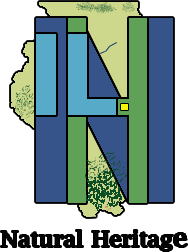Welcome to the Division of Natural Heritage

The Division of Natural Heritage works throughout the state to protect, maintain, and recover natural areas, endangered and threatened species, and other vulnerable plants and animals that represent Illinois' natural heritage. Our success depends upon dedicated staff who monitor the condition of these sensitive resources and utilize actions such as prescribed fire and the removal of invasive species to maintain a healthy and diverse ecosystem. The Division also strives to manage and recover more than 400 species of plants and animals classified as either endangered or threatened within the State of Illinois. Recovery efforts are diverse and include aspects of biological research, habitat improvement/creation, and even species reintroduction. While these precious natural resources lie at the heart of our work, the vast array of information resulting from these efforts is captured in the Natural Heritage Database. It serves as our conscience, providing information for natural resource reviews of development projects; guiding the issuance of endangered and threatened species incidental take and possession permits; identifying high priority areas for protection; and prioritizing public land acquisition.
The Division partners with the Illinois Nature Preserves Commission, to protect these unique natural areas through formal designation as Nature Preserves, Land and Water Reserves, or Natural Heritage Landmarks. Additionally, the Division works closely with the Endangered Species Protection Board to officially designate species as endangered or threatened and provide guidance on their long-term management and recovery throughout Illinois. The Division, along with the authorities and functions given to the Endangered Species Protection Board and the Illinois Nature Preserves Commission, provide a strong foundation for implementation the Division's mission to conserve Illinois' native flora, fauna, and natural communities through inventory, protection, and stewardship.
However, none of this would be possible without a stable source of money. State funding for the Division's work comes primarily through the Natural Areas Acquisition Fund – supported by a real estate transfer fee. This fund supports professional staff, land acquisition, and stewardship activities. In addition, the NAAF supports the Natural Areas Stewardship Grant Program which fosters conservation activities on Nature Preserves and Land and Water Reserves not owned by the Department. The Wildlife Preservation Fund , primarily supported by donations through the Illinois income tax checkoff system, provides grants for monitoring, research and other activities to promote Illinois' natural heritage. Additional fees collected by the Division are deposited into this fund.
In 2001, the US Congress created the State Wildlife Grants Program and charged states with developing proactive Wildlife Action Plans to conserve wildlife before they become more rare and costly to protect. Over 150 agencies and organizations comprising scientists, sportsmen, conservationists, government agencies, and other members of the community were part of the planning process and have a vested interest in partnering to achieve the goals identified in the Illinois Wildlife Action Plan. Federal funding under the State Wildlife Grants program (SWG) provides for a wide variety of wildlife habitat and species recovery projects, as well as for wildlife education and outreach, and has become a critical source of funding throughout the Department. Often, our work and funding can be used in conjunction with other funding sources such as the Wildlife Restoration Program (Pittman-Robertson Fund) that provides federal funds to fish and wildlife agencies for projects to restore, conserve, manage, and enhance wild birds and mammals and their habitat, as well as providing public access and hunter education.
We hope you enjoy learning more about the Division of Natural Heritage and our work to identify, protect, and steward Illinois' natural resources through this website!



